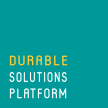At the Decade Mark of the Syrian Conflict and Displacement Crisis, New Report Spotlights Promising Practices Around World to Support the Resilience of Refugees and Host Communities
AMMAN and WASHINGTON — Ten years into Syria’s violent conflict, Syrians remain the largest refugee population worldwide, with nearly 5.5 million living in Turkey, Lebanon, Jordan and the Kurdistan Region of Iraq (KRI), and 6 million others internally displaced within Syria. With Syrian refugees facing limited resettlement opportunities and the unlikely prospect of return under safe and sustainable conditions, it is essential to explore ways to promote local solutions for refugees and improve social cohesion with host communities. Access to legal status, social protection, education, livelihoods and health care continues to be difficult for these refugees—challenges further exacerbated by the COVID-19 pandemic.
A new study resulting from a research project undertaken by the Durable Solutions Platform (DSP) and the Migration Policy Institute (MPI) identifies examples of promising practices that support the resilience of refugees and host communities in displacement contexts around the world. The report, A Bridge to Firmer Ground: Learning from International Experiences to Support Pathways to Solutions in the Syrian Refugee Context, spotlights policies and programs in 16 countries to draw lessons that could be applied to the Syrian refugee context.
The case studies collected in the report highlight partnerships between international donors, national governments, civil society and the private sector, and offer lessons for these actors, in five thematic areas:
- Protection: Initiatives such as Peru’s provision of legal status via a Temporary Stay Permit, Colombia’s statelessness-combating grant of temporary Colombian citizenship for children born there to Venezuelans and Ethiopia’s One-Stop Shop to overcome practical barriers to access documentation and services help address some of the most common protection gaps faced by refugees upon arrival in a country of first asylum.
- Social protection: Refugees’ inability or difficulty accessing national social welfare systems can be overcome by expanding access to those systems through different but complementary models and new approaches. Cameroon’s Transitional Safety Net approach, for example, shows how continuous social assistance to refugees from the Central African Republic, as well as host communities, over a two-year period can contribute to stimulate local investments and income-generating activities.
- Education: With many refugee children globally facing difficulty accessing primary education systems because of limited educational infrastructure, Uganda’s inclusive policies benefiting refugee and host-community students offer an example of promising cooperation between host governments, development organizations and humanitarian actors. In Australia, the out-of-school hours program Learning Beyond the Bell provides extra support to students who have significant levels of disadvantage, including refugees, to improve their learning outcomes.
- Livelihoods: Facilitation of access to formal labor markets is essential for refugees to achieve self-reliance but often controversial for host governments, even before the economic and labor market dislocations resulting from the pandemic. Programs such as one run in Latin America and the Caribbean by the Inter-American Development Bank can help overcome some of the structural challenges associated with high unemployment and manage social tensions if refugees are perceived as competing with nationals for jobs.
- Health care: Policies and programs in Jordan, Lebanon, Costa Rica and other countries offer lessons on addressing the barriers refugees face accessing health care, whether because they are not included in national insurance schemes, cannot afford the care or confront local health system capacity constraints. Costa Rica, for example, has provided 6,000 vulnerable refugees and asylum seekers access to its national health care system.
“In the past decade, the humanitarian and development sectors have demonstrated their ability to innovate, cooperate and facilitate pathways towards durable solutions for refugees,” the report finds. “These efforts have not come without difficulties related to design and operation, from challenges integrating refugees into existing policy frameworks to managing public opinion and other sensitivities.”
The researchers conclude that the initiatives profiled share a number of commonalities: Strong political leadership, cross-ministerial cooperation and the engagement of civil society and non-governmental actors; the continued support of international donors; a good understanding of the specific needs of refugees; and an inclusive approach that benefits host communities as well as refugees, among them.
“The reality is that many Syrians will continue to live, work and study in displacement for the foreseeable future,” the report notes. “Ensuring that refugees have the opportunity to enjoy decent living conditions, support their families and pursue an education is essential to mitigating the impact of protracted displacement on refugees and the communities where they reside.”
Read the report here: www.migrationpolicy.org/research/learning-international-experiences-syrian-refugee-context.
# # #
About the Durable Solutions Platform
Established in 2016, DSP generates knowledge and promotes strategic dialogue and program approaches to the long-term future of displaced Syrians based on international best practices and principles. Learn more about DSP: https://dsp-syria.org/.
About the Migration Policy Institute
MPI is an independent, non-partisan, non-profit think tank in Washington, D.C. dedicated to analysis of the movement of people worldwide. The Institute provides analysis, development and evaluation of migration and refugee policies at local, national and international levels. For more on MPI, visit www.migrationpolicy.org.


